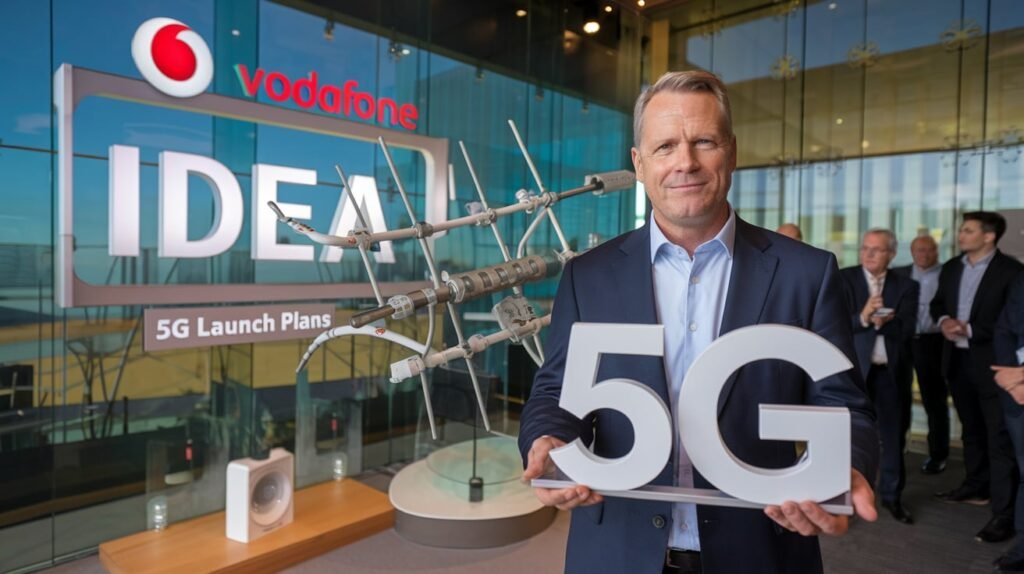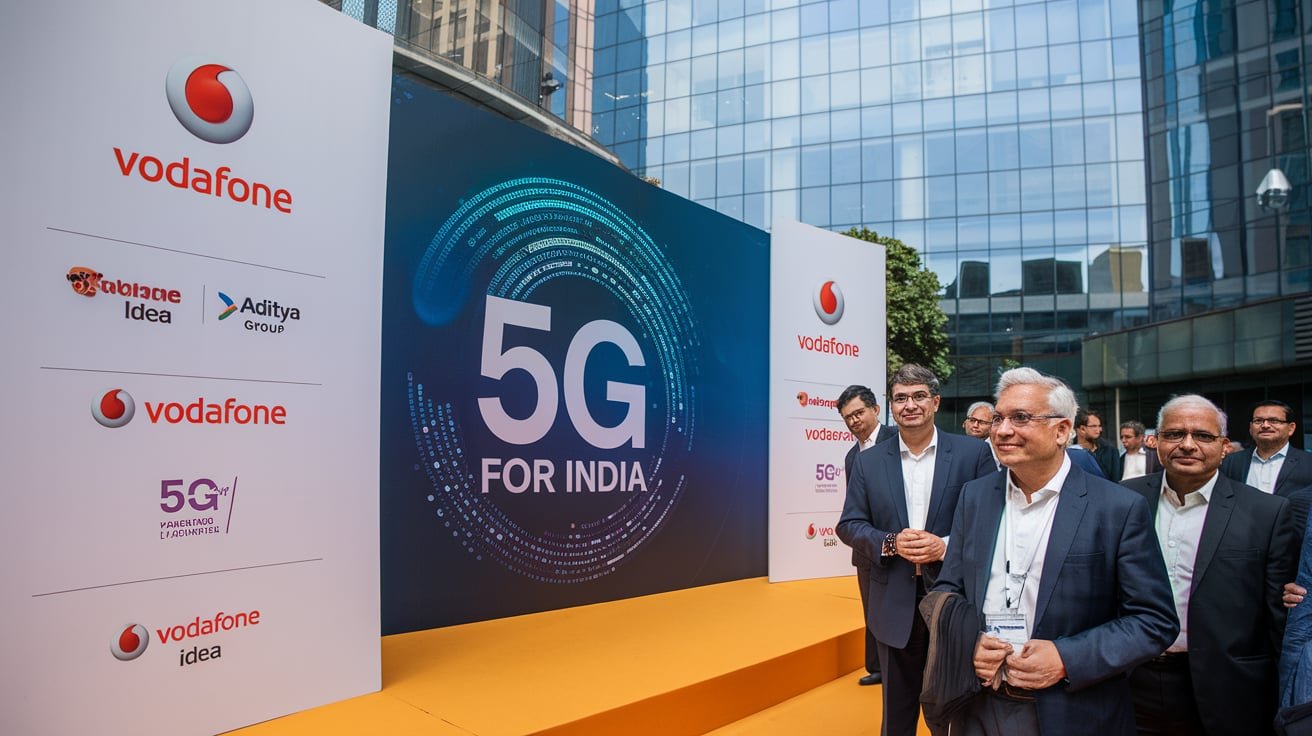Table of Contents
Introduction to Vodafone Idea’s 5G Ambitions

The advent of 5G technology marks a significant milestone in the telecommunications sector, promising enhanced connectivity, faster internet speeds, and improved overall user experiences. Vodafone Idea (VI), one of India’s prominent telecom players, is preparing to make its move in this competitive arena as it gears up for the much-anticipated Vodafone Idea 5G launch plans. As the company navigates the complex landscape dominated by rivals like Jio and Airtel, the significance of this rollout cannot be overstated.
The current state of the telecom industry is characterized by fierce competition, with Jio having established a substantial first-mover advantage in 5G deployment. Airtel has also made considerable strides, showcasing its commitment to expanding its 5G network. In this context, Vodafone Idea is not just aiming to catch up but to carve out a distinctive presence in the rapidly evolving market. The company’s strategy hinges on maximizing its existing infrastructure while innovating to meet the growing consumer demand for high-speed mobile data and reliable connections.
5G technology is set to transform the way consumers and businesses interact, enabling advancements such as smart cities, the Internet of Things (IoT), and augmented reality applications. For Vodafone Idea, launching a robust 5G network presents an opportunity to significantly enhance customer experiences, optimize operational efficiencies, and potentially reclaim market share lost to its competitors. As VI prepares for its 5G ambitions, the interplay of technology, market competition, and consumer expectations will shape the outcomes of its initiatives, solidifying its position in the telecom landscape.
Key Launch Details and Timeline
Vodafone Idea has set its sights on a strategic 5G rollout, with targeted launch plans scheduled for March 2025. The telecom company, often referred to as VI, is positioning itself to compete effectively with major players like Jio and Airtel in the rapidly evolving telecommunications market. This initiative marks a significant step for Vodafone Idea as it aims to enhance its service offerings and capture a larger share of the mobile connectivity segment.
The company’s 5G launch strategy is focused on addressing urban and industrial markets, which are vital to driving demand. VI plans to cover 75 major cities across 17 priority circles, indicative of a well-researched approach to market selection. The geographic targets include densely populated urban centers as well as key industrial locations, where the demand for high-speed internet and enhanced connectivity is expected to be robust. By concentrating resources on these areas, Vodafone Idea aims to establish a strong foothold in the competition inherently tied to the 5G deployment.
In line with the competitive landscape, Vodafone Idea is not just launching a new service; it is setting the stage for a comprehensive digital experience that is anticipated to facilitate advancements across various sectors, including education, healthcare, and smart city initiatives. The telecom firm recognizes that effective communication infrastructure will play a critical role in supporting these advancements and is accordingly prepared to invest significantly in its network capabilities. This groundwork is essential for rolling out reliable and high-capacity data services that can sustain the increasing demand for connectivity.
Overall, the countdown to Vodafone Idea’s 5G launch highlights the urgency within the industry to improve digital connectivity and keep pace with the advancements offered by competitors. Such strategic planning reinforces the company’s commitment to enhancing customer experience and operational efficiency in the fast approaching future.
Financing the 5G Rollout
Vodafone Idea’s ambitious plans to launch 5G services in India rely heavily on substantial financial backing. Recently, the company announced an impressive Rs 24,000 crore equity funding, which serves as a crucial capital injection to facilitate its 5G infrastructure development. This significant capital is expected to be instrumental in constructing new mobile towers, upgrading existing networks, and acquiring necessary equipment to support high-speed data services. In conjunction with this equity investment, Vodafone Idea anticipates raising an additional Rs 25,000 crore in debt, further enhancing its financial arsenal aimed at successfully rolling out 5G capabilities.
The combination of equity funding and anticipated debt highlights Vodafone Idea’s strategic approach to addressing the complexities associated with launching a state-of-the-art 5G network. By ensuring a robust financial foundation, the company aims to create a competitive edge against leading market players like Jio and Airtel. Investors and stakeholders alike are keenly interested in the effective utilization of these funds to drive growth and sustainable operations within the telecommunications sector. The robust financial framework behind Vodafone Idea’s 5G launch plans indicates a commitment to delivering quality service and infrastructure capable of meeting rising consumer demands.
With 5G technology promising faster speeds, lower latency, and greater connectivity, ensuring adequate funding is essential for Vodafone Idea to stand its ground in a competitive market. A comprehensive plan for deploying their 5G services that emphasizes technological advancement, customer satisfaction, and operational efficiency will be imperative. As the rollout unfolds, monitoring Vodafone Idea’s financial performance and investment strategies will be key to understanding the broader implications on the Indian telecommunications landscape.
Government Support and Regulatory Environment
The regulatory landscape plays a crucial role in shaping the telecommunications sector, particularly in the context of the Vodafone Idea 5G launch plans. The Indian government has taken several measures to facilitate the rollout of advanced telecom services, particularly 5G, aimed at promoting competition and innovation among players in the market. One of the notable developments in this regard has been the announcement to waive bank guarantees for telecom operators, an essential aspect that eases financial burdens and encourages swift expansion.
By eliminating the requirement for bank guarantees, the government has offered Vodafone Idea a significant financial reprieve. This move is strategically important as it lowers the initial capital expenditure associated with securing spectrum and ensures that Vodafone Idea can allocate resources more effectively towards enhancing its network infrastructure. The reduction in operational costs will allow the telecom operator to focus on expanding its coverage and improving service quality, a critical factor as it competes against industry giants like Jio and Airtel.
The supportive regulatory environment extended by the government further includes frameworks that facilitate seamless spectrum allocation, alongside policies aimed at expediting the approval process for launching innovative services. With these advantages, Vodafone Idea is better positioned to implement its 5G launch plans promptly, which is vital for maintaining competitiveness in a rapidly evolving market. Moreover, public investment initiatives and strategic partnerships encouraged by regulatory authorities signify a collaborative approach toward advancing digital infrastructure.
Ultimately, the combination of favorable regulations and government support can significantly bolster Vodafone Idea’s efforts to roll out 5G services efficiently. This is not just critical for the company’s future growth but also for enhancing the overall telecom landscape in India as the demand for high-speed internet connectivity continues to surge.
Leveraging Existing 4G Infrastructure
As Vodafone Idea prepares for its 5G launch plans, a significant strategy involves leveraging its existing 4G infrastructure. This strategic move aims to facilitate a more seamless transition to 5G services, capitalizing on the already established network that has garnered substantial user trust and familiarity. By building upon the established 4G framework, Vodafone Idea seeks to enhance the efficiency and speed of its impending 5G rollout while minimizing operational disruptions.
One of the primary advantages of utilizing the current 4G infrastructure is the potential for improved reliability. The existing network has undergone extensive testing and optimization, which can serve as a solid foundation for the upcoming 5G services. Users can expect a more stable connection, as the integration of 5G capabilities will be backed by the robustness of the established 4G architecture. Furthermore, this approach allows for a cost-effective deployment strategy. By not entirely overhauling the network, the company can allocate resources more judiciously, ensuring that investments lead to substantial improvements without unnecessary expenditures.
Moreover, leveraging the existing network reduces the time required for deployment. Traditional strategies for launching new technologies often involve lengthy build-outs that can lead to customer dissatisfaction during transition periods. However, by employing the established 4G infrastructure, Vodafone Idea aims to enhance customer experience during this transformative phase, mitigating potential service interruptions.
In addition to bolstering speed and reliability, this approach may significantly enhance the overall customer experience. Vodafone Idea’s commitment to maximizing its current technology underscores the company’s dedication to ensuring that users receive not only the anticipated enhanced services but also the consistent connectivity they require. As Vodafone Idea navigates its 5G launch plans, the focus on integrating its existing 4G network will be pivotal in successfully competing with industry giants like Jio and Airtel.
Strategic Pricing and Market Competition
The launch of Vodafone Idea’s 5G plans is anticipated to significantly influence its competitive stance in the market, particularly against formidable rivals like Jio and Airtel. As Vodafone Idea prepares for its 5G launch, a pivotal aspect of its strategic approach lies in the pricing model it intends to implement. Aggressive pricing strategies are crucial for regaining lost market share, as the telecom sector has witnessed unprecedented competitive dynamics driven by low-cost offerings from competitors. Vodafone Idea must navigate this landscape carefully, ensuring that pricing strategies not only attract new customers but also bolster the Average Revenue Per User (ARPU) metric.
A key challenge for Vodafone Idea is striking the right balance between competitive pricing and profitability. While lower tariffs may entice customers, they could also lead to diminishing returns if not managed effectively. Therefore, Vodafone Idea’s 5G launch plans may focus on introductory offers that are economically appealing yet sustainable over the long term. By providing attractive packages, the company can capture a wider audience while still aiming for an increase in ARPU through value-added services and enhanced user experiences.
Moreover, as Vodafone Idea seeks to differentiate itself in a saturated market, strategic pricing can also serve as a tool for customer retention. Offering bundled services or loyalty programs alongside competitively priced 5G plans could enhance customer satisfaction and encourage long-term subscriptions. This approach not only addresses immediate pricing concerns but also promotes brand loyalty, which is essential in a highly volatile environment characterized by fierce competition among telecommunications providers.
Ultimately, the success of Vodafone Idea’s 5G launch will largely depend on how effectively it leverages strategic pricing to navigate market competition while ensuring financial health. A thoughtful approach that combines competitive rates with ARPU growth strategies can position Vodafone Idea favorably against its rivals in the quest for market dominance.
Enhancing Visibility and Customer Attraction
In a highly competitive telecommunications landscape, Vodafone Idea, commonly known as VI, is gearing up for the launch of its new 5G services, with strategic initiatives to enhance visibility and customer attraction. As part of its plans for the Vodafone Idea 5G launch, the company is set to increase dealer commissions significantly. This move aims to incentivize local retailers and outlets to actively promote VI’s services, thereby reaching a wider audience and improving sales conversions.
In addition to boosting dealer commissions, VI plans to ramp up its marketing investments, focusing on building brand awareness and highlighting the superior features and benefits associated with its upcoming 5G offerings. Marketing campaigns will be tailored to resonate with diverse demographic segments, ensuring that the messaging reflects the varied needs and expectations of potential consumers. The strategic allocation of funds towards advertising across various platforms—such as digital mediums, television, and print media—aims to create a robust presence that captures customer attention and fosters interest in Vodafone Idea 5G launch plans.
Furthermore, engaging customers through incentives such as promotional offers and bundling services could enhance customer retention during this pivotal launch period. These strategies not only aim to attract new customers but also focus on solidifying the relationship with existing subscribers, ensuring they feel valued and recognized. As the launch date approaches, the emphasis on enhancing visibility through these planned actions will play a significant role in distinguishing Vodafone Idea from competitors like Jio and Airtel, thereby facilitating a successful entry into the 5G domain.
Technological Partnerships and Network Optimization
As Vodafone Idea gears up for its 5G launch plans, strategic collaborations with leading technology firms are pivotal in shaping its network infrastructure and operational capabilities. Vodafone Idea has partnered with industry giants such as Nokia, Ericsson, and Samsung to facilitate the necessary upgrades and enhance the overall performance of its network. These partnerships are not merely for supply purposes; rather, they signify a commitment to adopting innovative technologies that will help realize a robust 5G network.
Nokia’s advanced AI-powered Mantaray SON (Self-Organizing Network) solution is a significant component of Vodafone Idea’s strategy. Mantaray SON plays a crucial role in optimizing network performance, enabling Vodafone Idea to deliver a seamless user experience. By employing artificial intelligence, this technology automatically adjusts network parameters to meet real-time demands, thereby enhancing operational efficiencies. The dynamic adjustment capability ensures that resources are effectively allocated as network traffic fluctuates, ultimately supporting Vodafone Idea’s ambitious 5G launch plans.
In addition to Mantaray SON, collaborations with Ericsson and Samsung focus on deploying new radio technologies and improving the core network architecture. These enhancements are essential for supporting the high-speed data requirements typical of 5G services. Ericsson’s Radio System, along with Samsung’s cutting-edge RAN (Radio Access Network) solutions, provides Vodafone Idea with the necessary framework to compete effectively in the increasingly congested 5G landscape.
The concerted effort to leverage these advanced technologies not only positions Vodafone Idea favorably against its competitors, such as Jio and Airtel, but also underscores its commitment to deliver reliable, high-speed connectivity to its customers. As the 5G landscape evolves, these partnerships will empower Vodafone Idea to push forward and realize its vision for a transformative 5G experience.
Challenges Ahead and Future Outlook
The rollout of Vodafone Idea’s 5G launch plans comes with a myriad of challenges that could significantly impact its market presence and long-term viability. One of the primary hurdles Vodafone Idea faces is market penetration, especially in areas where competitors like Jio and Airtel have established strong footholds. These companies have already developed extensive infrastructure that enables them to offer faster and more reliable services, thereby attracting a substantial customer base. Vodafone Idea must swiftly address infrastructure expansion to avoid lagging behind in the intense rivalry characterized by the telecommunications sector.
Furthermore, the high stakes of competition present a formidable challenge. Jio, for instance, has built a reputation for affordability and superior customer service, while Airtel enjoys strong brand loyalty. To effectively compete, Vodafone Idea must differentiate itself through innovative offerings and strategic marketing. The company could benefit from positioning its 5G services as not just an upgrade in speed but as a transformative experience that adds value to the user’s lifestyle. This can be accomplished through partnerships with content providers or unique service bundles that appeal to diverse customer segments.
Another significant concern is the financial burden associated with 5G deployment. The costs involved in upgrading infrastructure, implementing new technologies, and securing licenses are substantial. Vodafone Idea will need to craft a strategic financial plan to minimize risks and manage operational expenses effectively. Additionally, market conditions, including regulatory challenges and fluctuating consumer demand, will play a crucial role in shaping Vodafone Idea’s long-term outlook in the 5G landscape. With careful navigation of these challenges and a robust strategy, there remains a pathway for Vodafone Idea to thrive amidst stiff competition.





